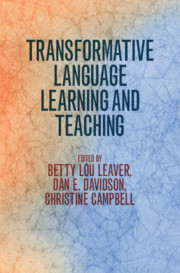Book contents
- Transformative Language Learning and Teaching
- Transformative Language Learning and Teaching
- Copyright page
- Contents
- Figures
- Tables
- Contributors
- Foreword
- Acknowledgments
- Abbreviations
- 1 Introduction
- Part I Theoretical Framework
- 2 Transformative Language Learning and Teaching
- 3 Shaking the Foundations
- 4 Transformative Learning at the Multilingual Turn
- Part II Transformative Language Learning and Teaching Applications in Government Programs
- Part III Transformative Language Learning and Teaching Applications in University Programs
- Part IV Transformative Language Learning and Teaching Applications in Immersion Programs
- Part V The Learner
- Part VI Faculty Development
- Part VII Assessment
- References
- Index
3 - Shaking the Foundations
Transformative Learning in the Field of Teaching English to Speakers of Other Languages
from Part I - Theoretical Framework
Published online by Cambridge University Press: 26 January 2021
- Transformative Language Learning and Teaching
- Transformative Language Learning and Teaching
- Copyright page
- Contents
- Figures
- Tables
- Contributors
- Foreword
- Acknowledgments
- Abbreviations
- 1 Introduction
- Part I Theoretical Framework
- 2 Transformative Language Learning and Teaching
- 3 Shaking the Foundations
- 4 Transformative Learning at the Multilingual Turn
- Part II Transformative Language Learning and Teaching Applications in Government Programs
- Part III Transformative Language Learning and Teaching Applications in University Programs
- Part IV Transformative Language Learning and Teaching Applications in Immersion Programs
- Part V The Learner
- Part VI Faculty Development
- Part VII Assessment
- References
- Index
Summary
This chapter argues that given the radical changes in the world's climate and biosphere, and their impact on language learners and on the changing nature of language, culture, literacies, and semiotics, the language field is well advised to look specifically to the transformative learning theories of Daisaku Ikeda and Edmund O'Sullivan. The chapter concludes that as the fields of bilingual, second, and world language education cohere into the multilingual turn, the existential crises of climate change demand that these fields enact an even greater paradigm shift by engaging climate as the integrating focus of language and culture learning and instruction. Ikeda and O'Sullivan's East–West perspective of selfhood provides a “deep cultural” foundation for such transformative language learning.
Keywords
- Type
- Chapter
- Information
- Transformative Language Learning and Teaching , pp. 23 - 31Publisher: Cambridge University PressPrint publication year: 2021

